
Heart disease is a condition where your heart doesn’t work properly. It can be caused by things like high blood pressure, high cholesterol, or smoking.
People with heart disease are at a higher risk of having a heart attack or stroke, which can be very serious and even deadly.
Nuts and seeds are foods that come from plants. Examples of nuts include almonds, walnuts, and peanuts. Examples of seeds include chia seeds, pumpkin seeds, and sunflower seeds.
Nuts and seeds are often rich in healthy fats, fiber, vitamins, and minerals, and they can be a good source of protein.
In a new study from the University of Oslo and elsewhere, researchers found eating a healthy diet that includes nuts and seeds may help lower the risk of heart disease and improve heart health.
The researchers did a review of studies to see if eating nuts and seeds is good for your heart and blood sugar levels.
They looked at studies with adults that were done over a long time and studies where people were given nuts or seeds to eat for at least 12 weeks.
The team wanted to see if eating nuts and seeds would lower the risk of heart disease, stroke, and diabetes.
They also looked at how nuts and seeds affected things like cholesterol, blood pressure, and blood sugar levels.
The researchers found 42 studies with over 1.8 million people and 18 studies with 2,266 people that met our criteria.
People who ate more nuts and seeds had a lower risk of heart disease, especially coronary heart disease.
Eating nuts and seeds didn’t seem to affect stroke or diabetes risk as much, but there was limited information on those.
Eating nuts and seeds also helps lower cholesterol levels, but it didn’t seem to affect blood pressure.
The results on blood sugar levels were mixed. The team rated the evidence of a link between nuts and seeds and a lower risk of heart disease as probable.
Overall, it seems that eating nuts and seeds are good for your heart health, but more research is needed to be sure about the effects on other health conditions.
Scientists also need to look at specific types of nuts and seeds to see if they have different benefits.
Different types of nuts have unique nutrient profiles, so incorporating a variety of nuts into your diet can provide a range of health benefits. Here are some of the benefits associated with different types of nuts:
Almonds: Almonds are rich in healthy fats, fiber, vitamin E, and magnesium. They have been linked to lower blood sugar levels, improved cholesterol levels, and lower risk of heart disease.
Walnuts: Walnuts are high in omega-3 fatty acids, which have been shown to lower inflammation and reduce the risk of heart disease. They may also improve brain function and support healthy aging.
Pistachios: Pistachios are rich in protein, fiber, and healthy fats, which can help with weight management and lower the risk of heart disease. They also contain antioxidants that may improve blood vessel function.
Cashews: Cashews are a good source of healthy fats, protein, and magnesium. They may improve cholesterol levels and lower blood pressure.
Peanuts: Peanuts are high in protein, fiber, and healthy fats. They contain a type of antioxidant called resveratrol, which has been linked to a lower risk of heart disease.
Brazil nuts: Brazil nuts are one of the richest dietary sources of selenium, a mineral that is important for immune function and may reduce inflammation.
However, because they are so high in selenium, it’s important to limit intake to a few nuts per day to avoid consuming too much.
Hazelnuts: Hazelnuts are a good source of fiber, healthy fats, and antioxidants. They may improve cholesterol levels and lower inflammation.
It’s important to note that while each type of nut has unique health benefits, they are all nutritious and can be incorporated into a healthy diet.
The research was published in Food & Nutrition Research and was conducted by Erik Kristoffer Arnesen et al.
If you care about heart health, please read studies about the best time to take vitamins to prevent heart disease, and calcium supplements could harm your heart health.
For more information about heart health, please see recent studies that artificial sweeteners in food are linked to a higher risk of heart disease, and results showing people who have the lowest heart disease and stroke risks.
Copyright © 2023 Scientific Diet. All rights reserved.








